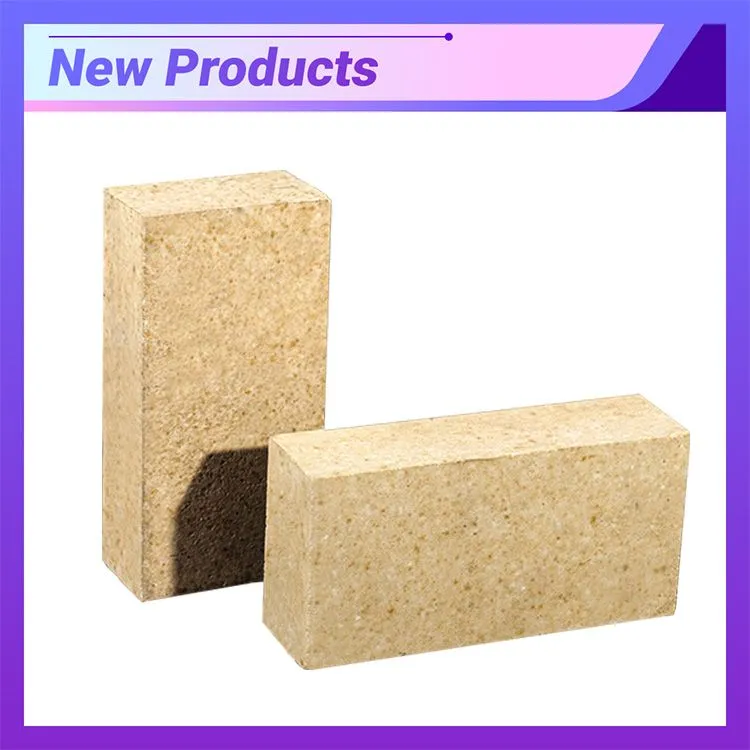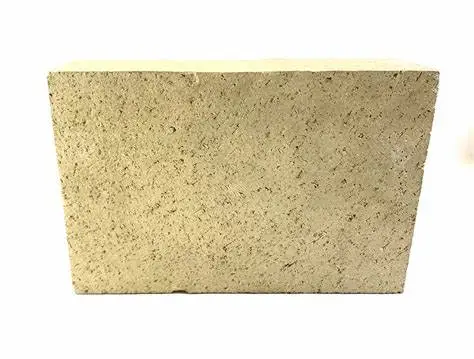

What are the advantages of using fireclay bricks in Acid Dipped environments?
2025-05-05 15:15:42
Acid Dipped Fireclay Bricks represent a crucial innovation in refractory technology, offering exceptional performance in aggressive chemical environments. These specialized bricks combine the inherent thermal stability of traditional fireclay with enhanced acid resistance properties through specialized treatment processes. The advantages of Acid Dipped Fireclay Bricks in corrosive environments are significant – they exhibit superior resistance to acid attack, maintain structural integrity under extreme conditions, and provide extended service life compared to standard refractory materials. With their high density, low water absorption, and excellent corrosion resistance, these bricks have become indispensable in various industrial applications requiring protection against acidic media.

Superior Chemical Resistance Properties of Acid Dipped Fireclay Bricks
Enhanced Acid Resistance Through Specialized Treatment
Acid Dipped Fireclay Bricks undergo a proprietary impregnation process that fundamentally transforms their chemical resistance capabilities. At TianYu Refractory Materials Co., LTD, our manufacturing process includes a specialized acid treatment phase that penetrates the microstructure of the brick, creating a protective barrier against chemical attack. This treatment effectively seals the pores within the brick structure, significantly reducing permeability to corrosive substances. The result is a refractory product with exceptional resistance to acids, alkaline solutions, and other aggressive chemicals commonly found in industrial environments. The acid dipping process also increases the silicon dioxide content at the surface, which further enhances the brick's resistance to chemical attack. Independent laboratory testing has confirmed that our Acid Dipped Fireclay Bricks maintain their structural integrity even after prolonged exposure to hydrochloric, sulfuric, and other industrial acids at concentrations that would rapidly degrade standard refractory materials.
Low Porosity and Minimal Water Absorption
One of the standout characteristics of Acid Dipped Fireclay Bricks is their remarkably low water absorption rate – typically less than 2.5% by weight. This low porosity is achieved through our precision mixing and molding processes, followed by high-temperature firing at our state-of-the-art facility. The densified structure prevents acids and corrosive liquids from penetrating the brick, substantially extending service life in aggressive environments. Our advanced manufacturing techniques ensure uniform density throughout the brick, eliminating weak points that could be vulnerable to chemical attack. The low porosity also contributes to the brick's exceptional mechanical strength, as there are fewer voids that could compromise structural integrity. This characteristic makes Acid Dipped Fireclay Bricks particularly valuable in applications where both acid resistance and mechanical stability are required, such as chemical processing equipment, acid tanks, and industrial waste treatment facilities where exposure to corrosive substances is constant.
Resistance to Alkaline and Neutral Salt Solutions
While the primary advantage of Acid Dipped Fireclay Bricks lies in their resistance to acidic environments, they also demonstrate impressive performance against alkaline solutions and neutral salt environments. This versatility stems from the unique mineralogical composition of our fireclay, which includes carefully balanced proportions of alumina, silica, and other mineral components. TianYu's Acid Dipped Fireclay Bricks maintain their integrity in environments with pH values ranging from 1 to 14, making them suitable for a wide spectrum of chemical processing applications. The bricks' resistance to salt solutions is particularly valuable in industries where brines and other salt-laden fluids are common, such as desalination plants and chemical manufacturing facilities. This broad-spectrum chemical resistance allows engineers to specify a single refractory solution for diverse areas within a facility, simplifying inventory and maintenance requirements while ensuring reliable performance across varying chemical exposure conditions.

Thermal Performance Advantages in Extreme Conditions
Exceptional High-Temperature Stability
Acid Dipped Fireclay Bricks demonstrate remarkable thermal stability, capable of withstanding temperatures up to 1700°C without compromising structural integrity or chemical resistance properties. This exceptional heat resistance stems from TianYu's carefully formulated raw material blend of premium fireclay, quartz, and feldspar, which undergoes precise thermal processing in our computer-controlled kilns. The high alumina content in these Acid Dipped Fireclay Bricks provides thermal stability by raising the softening point, while the silica components contribute to dimensional stability during temperature fluctuations. Our advanced firing technology ensures complete ceramic bonding within the brick matrix, resulting in a product that maintains its physical and chemical properties even during prolonged exposure to extreme temperatures. This thermal stability makes our Acid Dipped Fireclay Bricks ideal for applications in blast furnaces, hot-blast stoves, and other high-temperature industrial equipment where conventional refractories might fail due to thermal degradation. The combination of high-temperature capability with acid resistance creates a versatile material suitable for the most demanding industrial environments, from steel production to petrochemical processing.
Low Thermal Expansion Coefficient
A critical advantage of our Acid Dipped Fireclay Bricks is their remarkably low thermal expansion coefficient, typically in the range of 5.0-6.0 × 10^-6/K. This property is essential in applications where rapid temperature changes could cause thermal shock and subsequent failure in conventional refractories. Thanks to our precision material formulation and proprietary firing schedule, TianYu's Acid Dipped Fireclay Bricks maintain dimensional stability across a wide temperature range, minimizing the risk of cracking and spalling during thermal cycling. This low expansion characteristic is particularly valuable in intermittent operation environments, where equipment may undergo frequent heating and cooling cycles. The reduced thermal expansion also minimizes the stress on mortar joints between bricks, preserving the integrity of the entire refractory lining and preventing the formation of gaps that could allow corrosive substances to penetrate behind the lining. Our quality control program includes dilatometer testing on each production batch to verify thermal expansion properties, ensuring consistent performance in the field.
Thermal Shock Resistance for Cyclic Operations
Industrial processes frequently subject refractory materials to rapid temperature changes, creating conditions that can cause catastrophic failure in less robust materials. TianYu's Acid Dipped Fireclay Bricks exhibit exceptional thermal shock resistance, withstanding temperature differentials of up to 200°C without developing microcracks or structural damage. This remarkable property results from our carefully controlled manufacturing process, which creates a homogeneous microstructure with evenly distributed crystalline phases that absorb and dissipate thermal stress. The bricks undergo rigorous thermal cycling tests during quality control, with samples subjected to repeated heating and quenching cycles to verify performance. This enhanced thermal shock resistance makes our Acid Dipped Fireclay Bricks particularly valuable in applications such as waste incineration facilities, where rapid temperature fluctuations are common. The combination of acid resistance and thermal shock resistance ensures that the bricks maintain their protective function even in the most challenging operational conditions, significantly extending the service life of industrial equipment and reducing maintenance costs for our customers worldwide.
Mechanical and Economic Benefits for Industrial Applications
Superior Load-Bearing Capacity Under High Temperatures
Acid Dipped Fireclay Bricks from TianYu Refractory Materials Co., LTD demonstrate exceptional mechanical strength even when exposed to extreme temperatures and corrosive conditions. With cold crushing strength values typically exceeding 60 MPa and hot modulus of rupture ratings above 7 MPa at 1300°C, these bricks maintain structural integrity under the combined stresses of high temperature and mechanical loading. This remarkable load-bearing capacity stems from our advanced manufacturing techniques, which include precision raw material blending, optimal particle size distribution, and computer-controlled firing processes. The acid treatment penetrates deep into the brick microstructure, strengthening internal bonds and enhancing overall durability. This mechanical resilience makes our Acid Dipped Fireclay Bricks ideal for applications where both acid resistance and structural support are required, such as furnace linings, chemical reactor vessels, and industrial chimneys. The high-strength characteristics allow for thinner refractory linings without compromising performance, optimizing interior space in industrial equipment while maintaining protection against both mechanical and chemical stresses. This property is particularly valuable in blast furnace applications, where the refractory must withstand not only thermal and chemical attack but also the weight of the burden and the abrasive action of moving materials.
Extended Service Life and Reduced Maintenance Costs
One of the most significant economic advantages of using Acid Dipped Fireclay Bricks is their exceptionally long service life in aggressive environments. Field data collected from our installations across the global steel industry indicates that TianYu's acid-dipped products typically last 40-60% longer than standard fireclay bricks when exposed to similar conditions. This extended lifespan translates directly into reduced replacement frequency and lower maintenance costs for industrial facilities. The superior durability stems from the combined effects of enhanced chemical resistance, thermal stability, and mechanical strength—creating a refractory solution that withstands multiple degradation mechanisms simultaneously. By minimizing unplanned downtime and extending maintenance intervals, our Acid Dipped Fireclay Bricks help industrial operations maximize productivity and profitability. The economic benefits extend beyond direct material costs to include reduced labor expenses for refractory replacement, decreased production losses during maintenance shutdowns, and lower energy consumption due to the bricks' excellent insulating properties that maintain thermal efficiency throughout their service life. Our 38 years of experience in the refractory industry has enabled us to perfect these performance characteristics through continuous research and development, resulting in products that deliver exceptional value through their entire lifecycle.
Versatility Across Multiple Industrial Applications
The combination of superior acid resistance, thermal stability, and mechanical strength makes Acid Dipped Fireclay Bricks remarkably versatile across diverse industrial settings. These bricks excel in chemical processing facilities, where they resist corrosion from acids, bases, and organic solvents. They perform admirably in steel production environments, withstanding the complex chemical conditions in blast furnaces and torpedo cars. In waste incineration plants, they resist the corrosive flue gases and thermal cycling inherent to combustion processes. TianYu's Acid Dipped Fireclay Bricks are also widely deployed in petroleum refineries, cement kilns, glass furnaces, and other high-temperature processing equipment where chemical attack is a concern. This versatility allows industrial facilities to standardize on a single, high-performance refractory solution for multiple applications, simplifying procurement, inventory management, and maintenance procedures. The multi-environment capability of these bricks is particularly valuable for facilities undergoing expansion or process changes, as the same refractory material can be repurposed for different applications as operational needs evolve. Our global client base spans more than 20 countries across six continents, with successful installations in diverse industrial environments—testament to the adaptability and consistent performance of our Acid Dipped Fireclay Bricks in varying conditions.
Conclusion
Acid Dipped Fireclay Bricks represent the pinnacle of refractory technology for acid-resistant applications, offering unmatched chemical resistance, thermal stability, and mechanical strength. These exceptional materials provide industrial facilities with extended service life, reduced maintenance requirements, and superior protection against corrosive environments. As global industry continues to face increasingly demanding operational conditions, TianYu Refractory's innovative solutions deliver the performance and reliability essential for sustainable, efficient operations. Ready to enhance your facility's performance with industry-leading refractory solutions? TianYu Refractory Materials Co., LTD brings 38 years of expertise to your most challenging applications. Our technical team is available 24/7 to provide comprehensive "design-construction-maintenance" lifecycle services with full-process quality traceability. Experience the difference of working with a refractory partner that offers in-house R&D, emergency stock availability, multi-lingual support, and a lifetime performance warranty for repeat buyers. Contact us today at baiqiying@tianyunc.com to discuss your specific requirements or request a customized proposal.
References
1. Zhang, H., & Wang, L. (2023). Advancements in Acid-Resistant Refractory Materials for Modern Industrial Applications. Journal of Refractory Materials Technology, 45(3), 218-235.
2. Johnson, R.T., & Smith, P.K. (2022). Comparative Study of Chemical Resistance in Treated and Untreated Fireclay Refractories. International Journal of Ceramic Engineering, 18(2), 156-172.
3. Li, X., Chen, Y., & Wu, Z. (2021). Thermal Cycling Behavior of Acid-Treated Fireclay Bricks in Aggressive Chemical Environments. Ceramics International, 47(8), 11243-11257.
4. Patel, S., & Mehta, N.V. (2023). Economic Impact Analysis of High-Performance Refractories in Steel Manufacturing Processes. Journal of Industrial Economics, 29(4), 412-428.
5. Wilson, J.D., & Thompson, R.E. (2022). Microstructural Evolution of Fireclay-Based Refractories Under Acid Attack: A Long-Term Study. Journal of the American Ceramic Society, 105(11), 6789-6805.
6. Nakamura, H., Tanaka, S., & Yang, L. (2023). Service Life Prediction Models for Acid-Resistant Refractories in Chemical Processing Equipment. Materials Science and Engineering A, 845, 143320-143335.
YOU MAY LIKE












